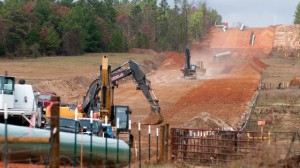
Crews work on construction of the TransCanada Keystone XL Pipeline east of Winona, Texas. (AP Photo/The Tyler Morning Telegraph, Sarah A. Miller)
Senate Republican Leader Mitch McConnell has said that approving the Keystone XL pipeline will top the Senate agenda as Congress reconvenes.
If approved, the Keystone project would move 830,000 of barrels of crude oil from the Alberta tar sands in Canada to refineries on the Gulf Coast of Texas every day.
The debate over Keystone is politically charged. You’ve no doubt heard the talking points on both sides of the issue. But digging past the politics, what’s really at stake? Who stands to win and who stands to lose if the pipeline is approved? To answer those questions, and others, we’ve put together an essential KXL reader.
What is Keystone XL?
The Washington Post published a Keystone primer complete with graphics showing the entire 1,179-mile route. The Southern leg of the pipeline went into operation last month. Writer Tara Lohan visited with some of the property owners affected by the project for BillMoyers.com — she called them “accidental activists.” Because it crosses an international border and requires State Department approval, the Northern leg has been more controversial. And that controversy is entering its ninth year — Maclean’s has a timeline of the project — and the debate it has ignited.
How Significant Is That Environmental Review?
The recently released environmental impact review was a blow to the project’s opponents. It found that approval of the pipeline wouldn’t have a significant impact on climate change. Barack Obama had said that he wouldn’t approve Keystone if it did. But it’s important to understand that the primary finding was not that extracting huge amounts of tar-sands oil wouldn’t have a significant impact. Rather, as the National Resource Defense Council’s (NRDC) Danielle Droitsch noted, the report concluded that the oil would be extracted with or without Keystone. As such, John Cushman writes at Inside Climate News, the report leaves the door open for the administration to either approve or reject the project. The review itself has been the subject of some controversy, as the State Department’s Inspector General’s office launched an investigation into potential conflicts of interest among the contractors that conducted the study. And Lee Fang reported for The Nation that the government of Alberta paid hundreds of thousands of dollars to the researchers responsible for a previous “independent” study with favorable results. ClimateProgress’s Ryan Koronowski offers “Seven Facts That Weren’t in the New State Department Report.”
What Is “Tar Sands” Crude Anyway?
The nonprofit group Environment Northeast has a primer on how oil is extracted from tar sands, what’s in it and why it comes with a greater environmental impact than crude oil extracted using traditional drilling. John Abraham and Danny Harvey reported for The Guardian that increased production of tar sands crude would make it impossible for Canada to meet its goal of reducing emissions by 17 percent of 2005 levels by 2020.
Another Concern: Safety
Mike Klink, a former pipeline inspector for Bechtel, which was working under contract with TransCanada — the company behind KXL — became a whistleblower when he wrote that TransCanada cut corners on the construction of the pipeline and as a result the project is a spill waiting to happen. Lisa Song reported for Inside Climate News that a major aquifer in Nebraska may be especially vulnerable to a spill. And Julie Dermansky reported for Truthout that TransCanada’s safety record on other projects is a cause for concern. More generally, the CBC has an interactive map of all the pipeline accidents in Canada between 2000 and 2012.
The Politics
Juliet Eilperin wrote a primer on the politics of KXL for The Washington Post. Desmog Canada issued a report detailing TransCanada’s lobbying activities. Jim Snyder reported for Bloomberg News that “at least a dozen state and federal Republican lawmakers” sent letters urging approval of the project which turned out to have been written by the Consumer Energy Alliance,” a Washington-based coalition of energy producers.” A majority of Americans favor the project — 56 percent in the latest USA Today poll. In Canada, public opinion appears to be declining; a poll released last month found 52 percent of Canadians in favor of the project, down 16 points from last April. Opposition to the project had also grown by 12 percentage points during the same period.
Other Controversies
A major issue has been the use of eminent domain to secure property for the pipeline route. Multiple lawsuits have challenged the practice; in Texas, the courts first ruled in TransCanada’s favor, but recently gave landowners hope by ordering the company to submit additional documentation on its use of eminent domain. The Nebraska legislature actually transferred its eminent domain power through Governor Dave Heineman to TransCanada, as Andrew Harris and Tom Witosky reported for Bloomberg Businessweek, and is facing a court challenge. Claims about the project’s potential to create new jobs have also been contested. A report by researchers at Cornell University’s Global Labor Institute found that the company’s projections weren’t accurate, and KXL would create only a marginal number of permanent positions.
What Now?
The State Department said last week it will postpone a final decision on the Keystone project until after Nebraska’s Supreme Court decides on the pipeline’s route inside the state. And in the latest round of protests against Keystone, the Cowboy and Indian Alliance — a group of ranchers, farmers and leaders of several Native American tribes — are descending on Washington, DC for a week-long event complete with horses, teepees and sacred fires. An estimated 5,000 activists will take part in a march past the Capitol on Saturday, organizers say.

